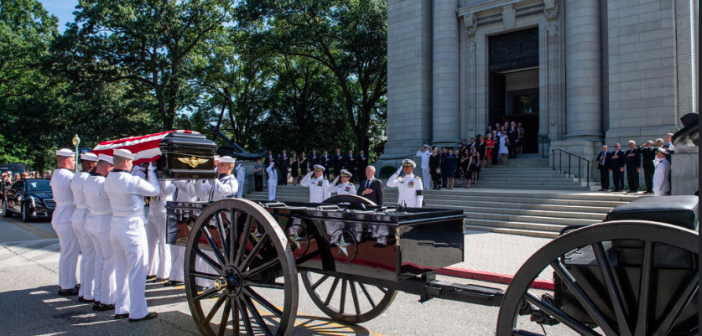As America and its allies bid farewell to one national security giant, they must prepare for the departure of another
Washington, the nation and the world last week bid an emotional farewell to Sen. John McCain, a towering international security figure who lost his battle with cancer.
More than any other lawmaker, McCain was a tireless champion for American ideals, the rules-based international order that has been the bedrock of global security since 1945, human rights and a vital reassuring voice as allies have been shaken by President Trump’s words and actions.
As cancer diminished McCain’s public role, Defense Secretary Jim Mattis has been instrumental in working with allies, reassuring them and as Bob Woodward’s new book, “Fear” suggests, served as a steadying influence on and otherwise impetuous president.
But even this steadying force may soon be gone. Several sources have said that Mattis is expected to resign after November’s elections and return to private life by year’s end.
The departure after two busy years on the job would not be a surprise, but would leave another palpable void that will be difficult to fill, increasing uncertainty at home and aboard.
Over nearly four decades, McCain cast a long shadow over budgets, strategy, acquisition programs and driving organizational and operational changes during America’s long wars. He also built invaluable worldwide relationships to help advance the interests of the United States and its allies, while continually messaging its adversaries. The Arizona Republican also had singular ability to galvanize bipartisan action.
Mattis’ tenure as defense secretary has been brief, having come to the job with a reputation as one of the nation’s most innovative and thoughtful general officers.
Justifiably proud that he’s the only other former general allowed to become defense secretary without a seven-year cooling off period — the other was the legendary George Marshall — Mattis has garnered accolades for helping shape cogent national security and defense strategies, refocusing the US military on great power competition and pressing allies to increase spending — one of Trump’s key priorities.
It’s not secret that Trump and Mattis differed on major issues, but the former Marine general has made clear it’s his job to advise the president. It’s up to the president to decide major issues. Mattis supported the Paris climate and Iran nuclear deals, opposed a separate space force and urged keeping US troops in South Korea and continuing training exercises with Seoul to deter North Korea. Despite being occasionally surprised by his boss, Mattis has remained a paragon of grace. He was the adult in the room who has excelled at his job without compromising his principles and will leave his command in better shape than he found it.
Early in the Trump administration, Mattis was among a number of stabilizing forces on the president, including Rex Tillerson, HR McMaster and Gary Cohn. Most were forced from their jobs and Trump has a reputation for turning on even his closest supporters.
Anticipating Mattis’ departure, the Washington Post has reported that the White House is working to identify a replacement.
Whoever it is must have the stature to effectively stand up to Trump when necessary while also preparing the Pentagon for a challenging future for which it is not yet ready to face.
After two decades of counter terror and counterinsurgency operations, DoD will have to change how it operates, what it buys and how it thinks about future conflict with potential adversaries who have spent decades developing systems and operational concepts aimed at methodically undermining American warfighting advantages.
While US military leaders exude confidence, those on the front lines know that they don’t have the necessary tools, training, operational concepts or material readiness to comfortably counter their great power adversaries in the event of conflict.
Mattis has wisely told his subordinates to stop publicly talking about shortcomings and focus on rapidly correcting them.
His replacement must drive change with equal urgency and credibility. Mattis’ great attribute is that he had earned the respect of everyone from lawmakers to subordinates down the chain of command to the junior-most troops.
Like McCain, he will be a tough act to follow. Here, the Senate must play a role to ensure Mattis’ successor is up to task. After being distracted from the global game, the Pentagon doesn’t have much time to get its act together. It’s adversaries and outbuilding it in terms of equipment, weapons and thinking.
The nation needs a new defense secretary who’s ready for the job and signals to potential adversaries that America is serious about stepping up its game.




